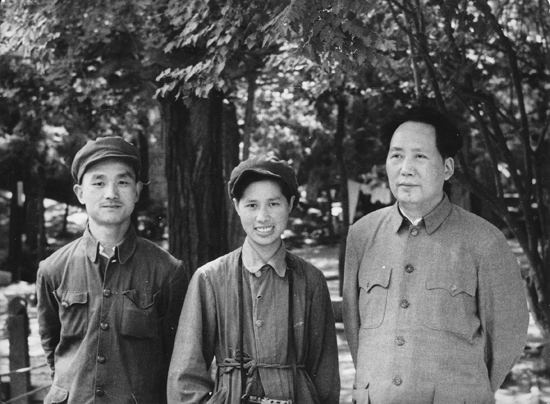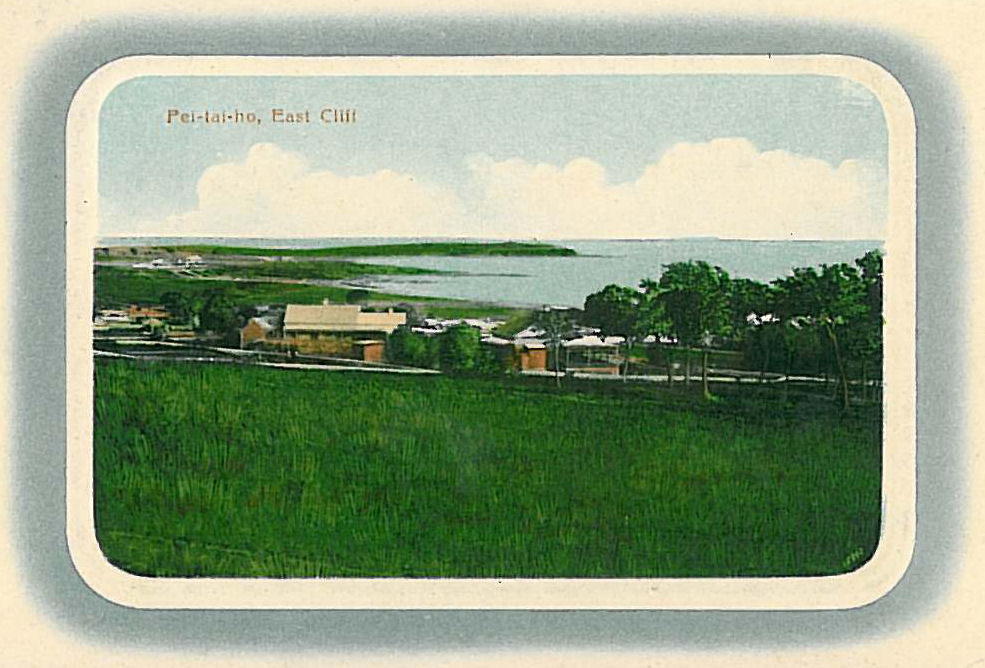|
Xu Xiaobing
Xu Xiaobing 徐肖冰 (16 August 1916 – 27 October 2009) was a Chinese cinematographer, filmmaker, and photojournalist. The Chinese Communist Party commissioned Xu and his wife, Hou Bo, to make an official photographic record to share with the Chinese and world public of Party leaders, scenes of battle, and vignettes of everyday life during the Second Sino-Japanese War (1937–1945) and especially of Mao Zedong from the 1930s down to the 1960s. The couple shot many of the best-known photos of Mao and other leaders. Xu was a member of the China Federation of Literary and Art Circles and President of the Chinese Photographers' Association. Xu Xiaobing, Hou Bo, and Lu Houmin have been called the best photographers of Mao. Early life Xu Xiaobing was born in 1916 in Tongxiang county, Zhejiang, to a family that had declined socially and economically. He was first schooled at home, then, at his grandfather's insistence, sent to a local traditional school, where he studied the Confuc ... [...More Info...] [...Related Items...] OR: [Wikipedia] [Google] [Baidu] |
Hou Bo
Hou Bo ( zh, 侯波; 17 September 1924 – 26 November 2017) was a Chinese photographer who, with her husband Xu Xiaobing, was among the best known photographers of Mao Zedong. Born into a poor peasant family, Hou Bo joined the Communist Party at the age of fourteen and learned photography during the Second Sino-Japanese War in order to present a better image of the Party's work to the world. After 1949, she and Xu Xiaobing lived in the same compound as Mao and took both official photos, some used for posters and publicity, which became the most widely circulated photos of Mao, and some family photos, taken informally behind the scenes. Among her best known photographs are "The Founding of the PRC" (1949), "Mao Zedong Swimming Across the Yangzi" (1955), "Chairman Mao at Work in an Airplane" (1959), and "Mao Zedong with Students from Latin America" (1959), which won First Prize in the National Photography Exhibition of 1959. Early life Hou Bo was born in September 1924 in Xia C ... [...More Info...] [...Related Items...] OR: [Wikipedia] [Google] [Baidu] |
Xu (surname)
Xu can refer to the following Chinese surnames that are homographs when Romanized using their Mandarin pronunciations: * Xu (surname 徐) * Xu (surname 許) * Xu (surname 須) The tones of these surnames are different in Mandarin, but if the tone diacritics are omitted then both surnames would be spelled Xu in pinyin, and Hsü in the Wade–Giles Wade–Giles () is a romanization system for Mandarin Chinese. It developed from a system produced by Thomas Francis Wade, during the mid-19th century, and was given completed form with Herbert A. Giles's '' Chinese–English Dictionary'' of ... system or Hsu if the diaeresis is also omitted. {{DEFAULTSORT:Xu (surname) Chinese-language surnames Multiple Chinese surnames ... [...More Info...] [...Related Items...] OR: [Wikipedia] [Google] [Baidu] |
Cai Shangxiong
Cai or CAI may refer to: Places * Cai (state), a state in ancient China * Caí River, Rio Grande do Sul, Brazil * Cái River, Vietnam * Cairo International Airport (IATA airport code) * Caithness, a historic county in Scotland (Chapman code) Organisations * Canadian Airlines International, a defunct Canadian airline * Capitol Archaeological Institute, an American archaeological research and education institute part of The George Washington University * Central Asia Institute, a non-profit organization that promotes education in Central Asia * Chartered Accountants Ireland, Ireland's largest accountancy body * Christian Assemblies International, an Australian-based charity organisation and religious group * Club Alpino Italiano, the Italian alpine club * Coleraine Academical Institution, a school in Northern Ireland * College of Anaesthesiologists of Ireland, a medical training body in Ireland * Community Associations Institute, an influential trade association and special inte ... [...More Info...] [...Related Items...] OR: [Wikipedia] [Google] [Baidu] |
2009 Deaths
This is a list of deaths of notable people, organised by year. New deaths articles are added to their respective month (e.g., Deaths in ) and then linked here. 2022 2021 2020 2019 2018 2017 2016 2015 2014 2013 2012 2011 2010 2009 2008 2007 2006 2005 2004 2003 2002 2001 2000 1999 1998 1997 1996 1995 1994 1993 1992 1991 1990 1989 1988 1987 See also * Lists of deaths by day The following pages, corresponding to the Gregorian calendar, list the historical events, births, deaths, and holidays and observances of the specified day of the year: Footnotes See also * Leap year * List of calendars * List of non-standard ... * Deaths by year {{DEFAULTSORT:deaths by year ... [...More Info...] [...Related Items...] OR: [Wikipedia] [Google] [Baidu] |
1916 Births
Events Below, the events of the First World War have the "WWI" prefix. January * January 1 – The British Empire, British Royal Army Medical Corps carries out the first successful blood transfusion, using blood that had been stored and cooled. * January 9 – WWI: Gallipoli Campaign: The last British troops are evacuated from Gallipoli, as the Ottoman Empire prevails over a joint British and French operation to capture Constantinople. * January 10 – WWI: Erzurum Offensive: Russia defeats the Ottoman Empire. * January 12 – The Gilbert and Ellice Islands Colony, part of the British Empire, is established in present-day Tuvalu and Kiribati. * January 13 – WWI: Battle of Wadi (1916), Battle of Wadi: Ottoman Empire forces defeat the British, during the Mesopotamian campaign in modern-day Iraq. * January 29 – WWI: Paris is bombed by German Empire, German zeppelins. * January 31 – WWI: An attack is planned on Verdun, France. February * ... [...More Info...] [...Related Items...] OR: [Wikipedia] [Google] [Baidu] |
Jiang Qing
Jiang Qing (19 March 191414 May 1991), also known as Madame Mao, was a Chinese communist revolutionary, actress, and major political figure during the Cultural Revolution (1966–1976). She was the fourth wife of Mao Zedong, the Chairman of the Communist Party and Paramount leader of China. She used the stage name Lan Ping () during her acting career (which ended in 1938), and was known by many other names. Qing married Mao in Yan'an in November 1938 and served as the inaugural " First Lady" of the People's Republic of China. Jiang was best known for playing a major role in the Cultural Revolution and for forming the radical political alliance known as the " Gang of Four". Jiang served as Mao's personal secretary in the 1940s and was head of the Film Section of the Communist Party's Propaganda Department in the 1950s. She served as an important emissary for Mao in the early stages of the Cultural Revolution. In 1966, she was appointed deputy director of the Central Cu ... [...More Info...] [...Related Items...] OR: [Wikipedia] [Google] [Baidu] |
Cultural Revolution
The Cultural Revolution, formally known as the Great Proletarian Cultural Revolution, was a sociopolitical movement in the People's Republic of China (PRC) launched by Mao Zedong in 1966, and lasting until his death in 1976. Its stated goal was to preserve Chinese communism by purging remnants of capitalist and traditional elements from Chinese society. The Revolution marked the effective commanding return of Mao –who was still the Chairman of the Chinese Communist Party (CCP)– to the centre of power, after a period of self-abstention and ceding to less radical leadership in the aftermath of the Mao-led Great Leap Forward debacle and the Great Chinese Famine (1959–1961). The Revolution failed to achieve its main goals. Launching the movement in May 1966 with the help of the Cultural Revolution Group, Mao charged that bourgeois elements had infiltrated the government and society with the aim of restoring capitalism. Mao called on young people to "bombard the headqu ... [...More Info...] [...Related Items...] OR: [Wikipedia] [Google] [Baidu] |
Beidaihe
Beidaihe District () is a popular beach resort and a district of the city of Qinhuangdao, Hebei province on China's Bohai Sea coast. It has an area of and, , a population of 66,000, as well as a coastline of . It is also known as a birding haven. The Beidaihe Beach Resort stretches from east to west, from the Yinjiao Pavilion to the mouth of the Daihe river. The beach itself is covered with fine yellow sand stretching some 100 meters to the sea. The water is shallow. Mount Lianfeng near the beach has two peaks covered by abundant green pines and cypresses. Lush vegetation, caves, decorated pavilions, secluded paths and winding bridges have made it attractive to visitors from throughout China. English railway engineers were the first Europeans to discover the fishing village in the 1890s and it was not long before wealthy Chinese and foreign diplomats from Beijing and Tianjin made the village a popular destination. Use by Communist Party Because of its proximity to the capi ... [...More Info...] [...Related Items...] OR: [Wikipedia] [Google] [Baidu] |
Patrick Hurley
Patrick Jay Hurley (January 8, 1883July 30, 1963) was an American politician and diplomat. He was the United States Secretary of War from 1929 to 1933, but is best remembered for being Ambassador to China in 1945, during which he was instrumental in getting Joseph Stilwell recalled from China and replaced with the more diplomatic General Albert Coady Wedemeyer. A man of humble origins, Hurley's lack of what was considered to be a proper ambassadorial demeanor and mode of social interaction made professional diplomats scornful of him. He came to share pre-eminent army strategist Wedemeyer's view that the Chinese Communists could be defeated and America ought to commit to doing so even if it meant backing the Kuomintang and Chiang Kai-shek to the hilt. Frustrated, Hurley resigned as Ambassador to China in 1945, publicised his concerns about high-ranking members of the State Department, and alleged they believed that the Chinese Communists were not totalitarians and that America's pr ... [...More Info...] [...Related Items...] OR: [Wikipedia] [Google] [Baidu] |
1940pengdehuai
Year 194 ( CXCIV) was a common year starting on Tuesday (link will display the full calendar) of the Julian calendar. At the time, it was known as the Year of the Consulship of Septimius and Septimius (or, less frequently, year 947 ''Ab urbe condita''). The denomination 194 for this year has been used since the early medieval period, when the Anno Domini calendar era became the prevalent method in Europe for naming years. Events By place Roman Empire * Emperor Septimius Severus and Decimus Clodius Septimius Albinus Caesar become Roman Consuls. * Battle of Issus: Septimius Severus marches with his army (12 legions) to Cilicia, and defeats Pescennius Niger, Roman governor of Syria. Pescennius retreats to Antioch, and is executed by Severus' troops. * Septimius Severus besieges Byzantium (194–196); the city walls suffer extensive damage. Asia * Battle of Yan Province: Warlords Cao Cao and Lü Bu fight for control over Yan Province; the battle lasts for over 100 day ... [...More Info...] [...Related Items...] OR: [Wikipedia] [Google] [Baidu] |
Mao Yan'an Forum 1938
Mao Zedong pronounced ; also Romanization of Chinese, romanised traditionally as Mao Tse-tung. (26 December 1893 – 9 September 1976), also known as Chairman Mao, was a Chinese communist revolutionary who was the List of national founders, founder of the People's Republic of China (PRC), which he led as the chairman of the Chinese Communist Party from the Establishment of the People's Republic of China, establishment of the PRC in 1949 until Death and state funeral of Mao Zedong, his death in 1976. Ideologically a Marxist–Leninist, his theories, military strategies, and political policies are collectively known as Maoism. Mao was the son of a prosperous peasant in Shaoshan, Hunan. He supported Chinese nationalism and had an anti-imperialist outlook early in his life, and was particularly influenced by the events of the Xinhai Revolution of 1911 and May Fourth Movement of 1919. He later adopted Marxism–Leninism while working at Peking University as a librarian and bec ... [...More Info...] [...Related Items...] OR: [Wikipedia] [Google] [Baidu] |




.jpg)
